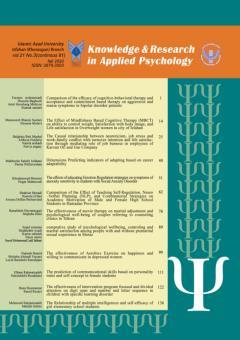The effec of couple therapy according to Islamic teachings on resilience and happiness of couples in Isfahan
Subject Areas : Familymohammad javad jaziny dorcheh 1 * , hassan heidari 2
1 - Counseling, Islamic Azad University of Khomein, Khomein, Iran.
2 - Academic member, Islamic Azad University of Khomein, Khomein, Iran
Keywords: couple therapy according to Islamic teachings, resilience, happiness, couples.,
Abstract :
The aim of this study was to investigate the effect of couple therapy according to Islamic teachings on resilience and happiness of couples. The research method was quasi-experimental with experimental and control groups and the statistical population included all couples referring to clinics in Isfahan in 2016, from which 30 couples were selected as a sample and by available sampling and replace in experimental and control groups (15 peer couples in every group). The instruments used included the Connor & Davidson Resilience Questionnaire (2010) and the Oxford Happiness Questionnaire (Argyle & Lu, 1990). After the pretest, the experimental group underwent couple therapy intervention in 10 sessions of 2 hours, but the control group did not receive any intervention. Mean, standard deviation and univariate analysis of covariance were used to analyze the data. The results of this study showed that the effect of couple therapy according to Islamic teachings on increasing resilience and happiness was significant (P <0.05).
The Holy Quran
Akbari, B, Moghtader, L, Khakbiz, K. (2020). Comparison of the effectiveness of communication skills training and cognitive-behavioral therapy in promoting marital satisfaction and happiness of couples with sexual desire disorders. Journal of Sabzevar University of Medical Sciences, 27 (4), 606-612.
Alipour, A. (2005). The relationship between happiness with personality. Journal of Psychological Science, 4, (14), 123-136. (in Persian).
Argyle, M., & Lu, L. (1990). The happiness of extraverts. Personality and Individual Differences, 11, 1011-1017.
Connor, K. M., & Davidson, J. R. (2003). Development of a new resilience scale: The Connor‐Davidson resilience scale (CD‐RISC). Depression and anxiety, 18(2), 76-82.
Davison, S. N, & Jhangri, G. S. (2012). The relationship between spirituality, psychosocial adjustment to illness, and health-related quality of life in patients with advanced chronic kidney disease. Journal of pain and symptom management, 1-9.
Etemadi, A, Nawabi Nejad, Sh, Ahmadi, A, & Farzad, V. (2006). Evaluation of the effectiveness of cognitive-behavioral couple therapy on intimacy of couples referring to counseling centers in Isfahan. Psychological Studies, 2 (1), 69-87. (in Persian).
Fehr, B. (2013). The social psychology of love. New York: Oxford University Press.
Finkelstein F.O, West, W, Gobin, J, Finkelstein S. H, & Wuerth, D. (2007). Spirituality, quality of life and the dialysis patient. NephrolDial Transplant, 22, 2432-2434.
Francis, L. J., Brown, I. B., Lester, D., & Philip, C. (1998). Happiness as stable extroversion: A cross-cultural examination of reliability and validity of Oxford Happiness Inventory among students in the U. K., U. S. A., Australia and Canada. Journal of Personality and Individual Diferences, 24, 167-171.
Jamali, F. (2003). A study of the relationship between religious attitudes, sense of meaning in life and mental health in students’ universities of Tehran. Degree of master of psychology. Alzahra university. Faculty of educational sciences and psychology. (in Persian).
Hadi Nejad, H., and Zarei, F. (2009). Reliability, validity, and standardization of the Oxford Happiness Questionnaire. Psychological Research, 12 (1-2 (23 consecutive), 62-77. (in Persian).
Hilles, P., & Argyle, M. (2001). Emotional stability as a Major Diemension of Happiness. Personality and Individual Differences, 31, 1357-1364.
Hills, P., & Argyle, M. (2002). The Oxford Happiness Questionnaire: a compact scale for the measurement of psychological well-being. Personality and individual differences, 33(7), 1073-1082.
Hunler OS, Gencoz T. (2005). The effect of religiousness on marital satisfaction: Testing the mediator role of marital problem solving between religiousness and marital satisfaction Relationship. Contemporary Family Therapy, 27 (1):123-36.
Jafari, F., Haj Hosseini, M., & Ghobari Bonab, b. (2018). The effectiveness of emotion-oriented counseling based on Islamic teachings on the intimacy of incompatible couples. Consulting Research (News and Consulting Research), 17 (68), 44-73. (in Persian).
Kaviany, Z, Hamid, N, & Enayati, M.S. (2014). The Effect of Religious–Based Cognitive Behavioral Therapy on Resiliency in Couples. Knowledge & Research in Applied Psychology, 57, 25-34. (in Persian).
Kayhani M, Taqvaee D, Rajabi A, & Amirpour B. (2014). Internal consistency and confirmatory factor analysis of Connor-Davidson resilience scale in female nursing students. Iranian journal of education in medical sciences, 14 (10): 851-859. (in Persian).
Lillis, J, Gifford, E, Humphreys, K, & Moos, R. (2008). Assessing spirituality/religiosity in the treatment environment: The Treatment Spirituality/Religiosity Scale. Journal of Substance Abuse Treatment, 35, 427–433.
Mahoney, A. (2005). Religion and conflict in marital solution-focused between religiosity and marital satisfaction. Contemporary Family Therapy, 27(1) 123-36.
Mehdi Nejad Ghoshchi, R., & Asadpour, I. (2017). Comparison of the effectiveness of couple therapy based on common factors with the content of Islamic teachings and without it on increasing the effective dialogue of couples. Cultural and Educational Quarterly of Women and Family, 12 (41), 23-45. (in Persian).
Mehdipour, R., and Beheshti, S., and Shafiabadi, A., and Delavar, A. (1397). Comparison of the effectiveness of Seligman positivist psychology group training and Islamic approach based on Quranic teachings on increasing the happiness of married working women. Consulting Research (News and Consulting Research), 17 (66), 32-57. (in Persian).
Myers, D. G. & E. Diener (1995) “Who is Happy?” Psychological Science, 6: 10-19.
ShahSiah, M., Bahrami, F. and Mohebi., S. (2009). The relationship between sexual satisfaction and marital commitment in Shahreza couples. Journal of Fundamentals of Mental Health, 11(3):233-238. (in Persian).
Shakib, T. (2008). Resilience. Teacher Growth, 20, 18.
Sternberg, R. J. (1994). Allowing for thinking styles. Educational Leadership, 52(3), 36-39.
The World Health Organization Quality of Life assessment. (2006). A cross-cultural study of spirituality, religion, and personal beliefs as components of quality of life. Social Science & Medicine, 62, 1486–1497.
Zadehush, S. (1390). Comparison of the effectiveness of cognitivebehavioral group therapy and classical cognitive-behavioral group therapy on marital relationship and family satisfaction. Master's thesis of clinical psychology, Isfahan University. (in Persian).

